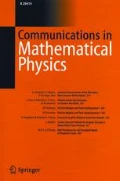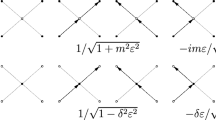Abstract
We investigate the ergodic properties of the equilibrium states of systems of infinitely many particles with respect to the group generated by space translations and time evolution. The particles are assumed to move independently in a periodic external field. We show that insofar as “good thermodynamic behavior” is concerned these properties provide much sharper discrimination than the ergodic properties of the time evolution alone. In particular, we show that though the infinite ideal gas is mixing in the space-time framework, it has vanishing space-time entropy and fails to be a space-timeK-system. On the other hand, if the particles interact with fixed convex scatterers (the Lorentz gas) the system forms a space-timeK-system. Also, the space-time entropy of a system of the type we consider is shown to equal its time entropy per unit volume.
Similar content being viewed by others
References
Goldstein, S., Lebowitz, J. L.: Commun. math. Phys.37, 1–18 (1974)
Aizenmann, M., Goldstein, S., Lebowitz, J. L.: Ergodic properties of a one-dimensional system of hard rods with an infinite number of degrees of freedom. (To appear)
Lanford III, O. E., Lebowitz, J. L.: Ergodic properties of an infinite harmonic crystal. (To appear)
Volkovysskii, K. L., Sinai, Y. G.: Funkts. Analiz5, No. 3, 19 (1971)
Sinai, Y. G.: Funkts. Analiz6, No. 1, 41 (1972)
Gallavotti, G., Ornstein, D. S.: Billiards and Bernoulli schemes. Commun. math. Phys. (in press) (1974)
Ornstein, D. S.: Ergodic theory, randomness, and dynamical systems. New Haven: Yale Univ. Press 1974
Billingsley, P.: Ergodic theory and information. New York: Wiley 1965
Ruelle, D.: Statistical mechanics. Rigorous results. New York: Benjamin 1967
Arnold, V. I., Avez, A.: Ergodic problems of classical mechanics. New York: Benjamin 1968
Conze, J. P.: Z. Wahrscheinlichkeitstheorie verw. Geb.25, 11–30 (1972)
Katznelson, Y., Weiss, B.: Israel J. Math.12, 161 (1972)
Rohlin, V. A.: Am. Math. Soc. Transl. (1)10, 1–54 (1962)
Parry, W.: Entropy and generators in ergodic theory. New York: Benjamin 1969
Halmos, P. R.: Measure theory. New York: Van Nostrand 1950
Goldstein, S., Lanford III, O. E.: Occupation number measures and the uniqueness of the state in classical statistical mechanics. (To appear)
Shields, P.: The theory of Bernoulli shifts. University of Chicago Press 1973
Sinai, Y. G.: Russ. Math. Surveys25, 137 (1970)
Jacobs, K.: Lecture notes on ergodic theory. Aarhus: 1962/63
Lanford O. E. III: Commun. math. Phys.9, 176 (1968)
Lanford O. E. III: Commun. math. Phys.11, 257 (1969)
Lanford III, O. E.: (To appear)
Author information
Authors and Affiliations
Additional information
Communicated by J. L. Lebowitz
Research supported in part by the National Science Foundation Grant No. GP-16147 A No. 1.
Rights and permissions
About this article
Cite this article
Goldstein, S. Space-time ergodic properties of systems of infinitely many independent particles. Commun.Math. Phys. 39, 303–327 (1975). https://doi.org/10.1007/BF01705377
Received:
Issue Date:
DOI: https://doi.org/10.1007/BF01705377



